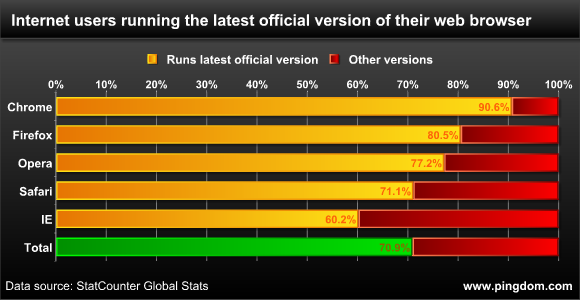It’s no secret that internet technology advances much faster than most people can keep up. If you asked your average internet user, you can bet they would have no idea what HTML5 is, why it’s important, or what it means for the mobile web. Hell, they might not know what mobile web means.
That’s why this chart from Pingdom.com is so crazy. Look how many people are running the current versions of their browsers. Even though Chrome is a notoriously geeky browser, the 90 percent current version stat is impressive. I’m not willing to give credit to the users for most of this. I think we can all admit that the numbers would be much lower if users were totally responsible for the updates. Developers, on the other hand, have done a great job of encouraging updates or even background updating.
For some people, that’s a problem, but as technology gets more advanced, it becomes increasingly unlikely that the general population will understand it. Until we hit some sort of soft wall, where the next great leap will be like that of the silicon chip, we won’t likely see a general population of users who actually understand what the machine they’re using does. Why do you think your parents call you all the time about pop-ups? It’s because they click things without thinking and don’t understand that the “Whack the Fly!” game is actually an advertisement or a wormbait.


